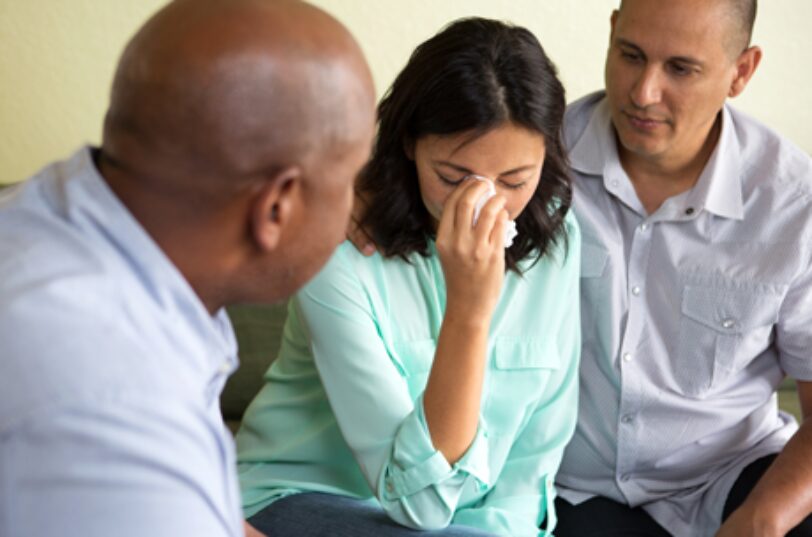
Grief therapy is a type of professional therapy designed to help you work through the various stages and range of emotions you may feel after a loss.
Grief is a natural response that occurs after losing someone or something of importance. While grief is traditionally regarded as an emotional reaction to loss, it also encompasses a person's physical, cognitive, behavioral, cultural, and spiritual aspects. Grief is a personal experience, and everyone grieves in their own way.
While there is no right or wrong way to grieve, sometimes feelings associated with grief can become overwhelming and affect a person's ability to lead an everyday life. When individuals struggle to cope with loss, grief therapy can help them tackle difficult emotions and adapt to a new life after loss.
What is Grief Therapy?
Grieving and coping with loss can be overwhelming for many. While grief can take many forms, it can significantly affect one’s mental health. When your feelings become overwhelming, and there seems like no end to your pain, seeking out grief therapy can help you work through your emotions in a safe and non-judgmental space.
Grief therapy, also known as bereavement therapy, is a form of professional therapy aimed at helping individuals cope with losing a partner, friend, co-worker, or pet. Counseling for grief may be provided by a counselor, therapist, psychologist, or support group. Whichever route you take, professional therapy can help you work through the different stages of grief and adjust to life changes that occur after a significant loss.
What Are the Stages of Grieving?
Although grief is experienced differently by each individual, people generally undergo five phases after experiencing loss: denial, anger, bargaining, depression, and acceptance. Grief is often non-linear, and not everyone will experience all five stages. Some people may follow a different sequence, while others may return to a previous stage.
Denial
In the first stage of grief, it can be difficult to fully register the pain, shock, and disbelief of losing someone. As grief can be an overwhelming emotion, the coping mechanism of denial gives a person time to process the news gradually. During this period, it's common for people to isolate, feel numb, lack motivation, struggle with sleeplessness, and feel forgetful.
Anger
In the second stage of grief, the person begins to adjust to reality and experience emotional discomfort. As many emotions rise to the surface, it is common for anger to be the outlet. You may blame others for your loss. You may feel angry at yourself. While it may feel like you are stuck in anger, it is an important part of the healing journey and will eventually pass.
Bargaining
During the bargaining stage, grieving individuals may negotiate to resume their normal lives. People commonly bargain with a higher power to restore a loved one's life. They may also dwell on what could have been done to prevent the loss. Many reflect on "what if" or "if only." In a painful situation, bargaining gives a person a chance to hold onto hope and gain control of the situation.
Depression
During the depression stage, sadness sets in as the person begins to realize the extent of the loss and how it impacts them. Depressive symptoms may include tearfulness, fatigue, decreased appetite, and loss of interest in everyday activities. Depression can be very intense and come in waves over several months or years.
Acceptance
During the last phase of grief, people begin to accept what has happened, and the pain may ease. Although you will never fully recover from the death and may still feel pain from time to time, you are no longer resisting the loss and can begin to move on with your life.
When Grief Overwhelms You
In the aftermath of loss, emotional and physical pain may affect a person's ability to function. How well you cope with loss can depend on many factors, such as your previous grief experiences, how many losses you've endured, and your support system. While grief affects each person differently, common symptoms may include:
- Intense sadness
- Shock or disbelief
- Anger
- Sleep disturbances
- Loss of appetite
- Isolation and loneliness
- Lack of interest in hobbies or daily activities
- Inability to engage in memories of the person lost
- Reduced sense of identity
Whatever you feel, it's important to know that you are not alone. When feelings of grief become unbearable, therapy can help support you throughout the grieving process and help you work through difficult emotions.
How Grief Therapy Can Be Helpful
When grief becomes chronic and interferes with daily life, grief therapy can give you a safe place to express your emotions and help you gain tools to maintain a normal life. While there are different types of grief therapy, each form aims to help individuals process their emotions and learn to cope with the grieving process.
- Grief therapy can help individuals with:
- Discussing the death and the person's significance to them
- Explaining their emotions and feelings
- Learning coping strategies to overcome challenging emotions
- Accepting grief as a normal process
- Recognizing unhealthy behaviors that can impact a person's life
- Developing new relationships
- Creating a new identity after loss
What Techniques Are Used in Grief Therapy?
Grief therapy gives you a safe place to discuss your feelings and learn important tools to assist in coping. Psychologists or therapists may use several therapeutic techniques to assist you in the grieving process.
Common techniques that grief counselors or therapists may use include:
- Cognitive Behavior Therapy (CBT): This form of therapy involves identifying and changing thought patterns that can negatively affect your behavior.
- Acceptance and Commitment Therapy (ACT): ACT involves accepting negative feelings and circumstances to focus on healthier patterns that will assist you in achieving your goals.
- Group Therapy: Therapy that takes place in a group setting can be incredibly comforting as it allows you to share your feelings with others who are going through the same thing.
- Art Therapy: Using creative forms to express emotions and promote healing can be helpful for those who may have difficulty expressing themselves.
- Play Therapy: This form of therapy can help therapists and counselors understand a child's thoughts and feelings after loss.
Grief Therapy at CHE
While there is no right or wrong way to grieve, professional support can help you work through the emotional pain after suffering a significant loss. When grief develops into depression and begins to interfere with daily life, therapy is often recommended.
CHE Behavioral Health Services offers a variety of online mental health services to treat grief and other conditions. With a network of over 850 psychiatrists, psychologists, nurse practitioners and related mental health professionals, we provide convenient and compassionate care.
To learn more about grief therapy at CHE, please call 888-515-3834.



